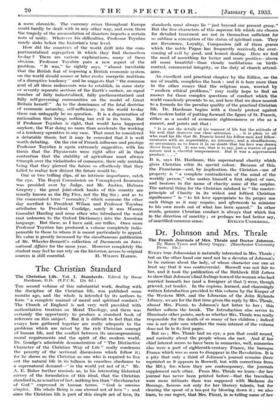The Christian Standard
The Christian Life. Vol. I. Standards. Edited by Oscar Hardman, D.D. (S.P.C.K. 12s. Ild.) Tux second volume of this substantial work, dealing with the discipline of the Christian life, was published some months ago, and the whole is intended by its authors to form "a complete manual of moral and spiritual conduct." The Church of England is not very well provided with authoritative treatises on Moral Theology, and there was certainly the opportunity to produce a standard book of- reference on this subject. But it is difficult to feel that the essays here gathered together are really adequate to the problems which are raised by the rich Christian concept of human life, and the conflict between its uncompromising moral requirements and the spirit of the modern world. Dr. Goudge's admirable demonstration of "The Distinctive Character of the Christian Way of Life" really condemns the poverty of the sectional discussions which follow it; for he shows us the Christian as one who is required to live out the natural life in its fullness in ceaseless obedience to a supernatural demand—" in the world yet not of it." Mr. A. E. Baker further reminds us, in his interesting historical survey of the formulation of this ideal, that the Christian standard is, as a matter of fact, nothing less than "the character of God" expressed in human terms. "God is omnino simplex. His whole Being is one eternal act of love " : and since the Christian life is part of this simple act of love, its standards must always lie "just beyond our present grasp." But the five characters of this supreme life which are chosen for detailed -treatment are not in themselves sufficient for so sublime a conception of the status of spiritual man. They are Reverence, Loyalty, Compassion (all of them graces which the noble Pagan has frequently received), the over- coming of evil by good, and honest dealing. Here we feel the need of something far better and more positive—above all more beautiful—than cloudy meditations on birth- control, commercial integrity, or the duty of church attend- ance. . . An excellent and practical chapter by the Editor, on the use of wealth, completes the book : and it is here more than in the other essays that the religious man, worried by " modern ethical problems," may really hope to find an answer for those complex questions of conduct which the world ceaselessly presents to as, and here that we draw nearest to a formula for the peculiar quality of the practical Christian life. Dr. Hardman begins with a timely protest against the modern habit of putting forward the figure of St. Francis, either as a model of economic righteousness or else as a mascot, and points out that : "It is not the details of his manner of life but the attitude of his soul that deserves our close attention . . . it is plain to all who read his life that St. Francis loved his fellow-men and fellow. creatures with an impartiality, an intensity, and a steadfastness, so uncommon as to leave it an no doubt that Ids love was drawn direct from God. It was not, that is to say, matter just a matr of good nature and a cheerful temperament. But it was a supernatural product. . . ."
It is, says Dr. lIardman, this supernatural charity which gives Christian ethic its special colour. Because of this, the Franciscan—and, by implication, the Christian—use of property is a complete contradiction of the mind of the worldly person," who makes himself a first object of care, and bestows in the name of charity some of the surplus. The natural thing for the Christian subdued to "the master- principle of Charity in its widest and loftiest Christian significance" is" to let love appropriate to its proper use such things as it may require, and afterwards to minister to his own needs out of what has been spared." In other words, genuine Christian conduct is always that which lies in the direction of sanctity ; or perhaps we had better say,




































 Previous page
Previous page